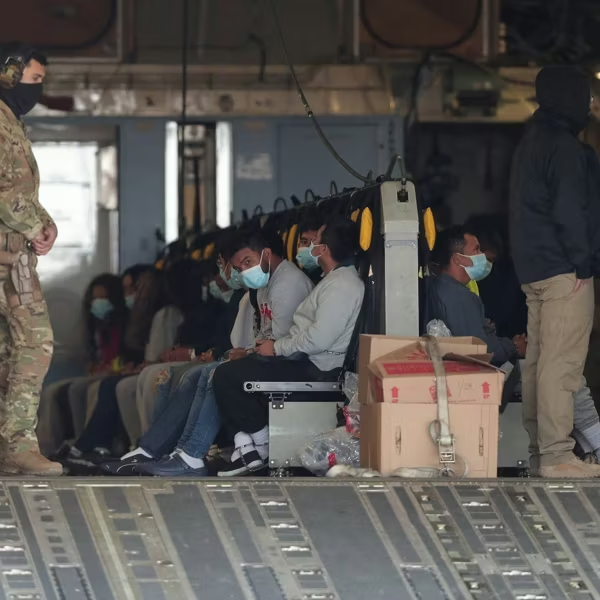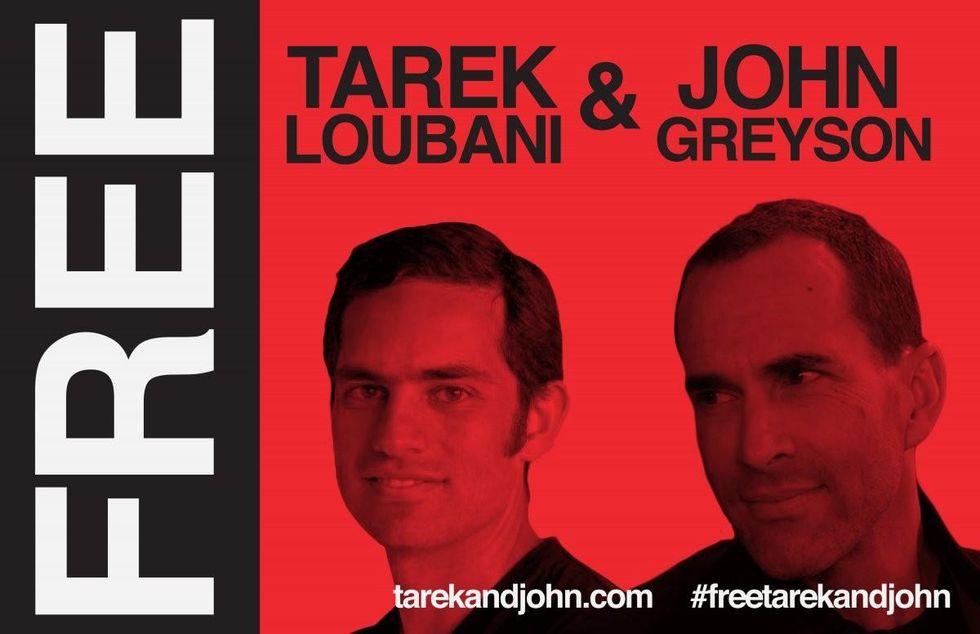The following statement is the first direct communication to the outside world from Canadians John Greyson and Tarek Loubani who have been locked up in Cairo's notorious Tora Prison since August 16. They have been held for almost 45 days and are in their second week of a hunger strike.The men have not been charged and their imprisonment has sparked international outcry, with 140,000 people signing a petition calling for their release, including some of the most well known names in the film industry and in academia. Amnesty International has also launched a campaign (Details here- pdf).
Greyson is a professor at the Department of Film at York University and a world renowned, award-winning film-maker. Tarek Loubani is an emergency room medical doctor and an assistant professor of emergency medicine at Western University (London, Ontario). Tarek leads a joint effort between Western University and the Al Shifa Hospital in Gaza that trains Palestinian emergency physicians.
On August 16th, the two were on route to Gaza, where Tarek was to continue his collaboration and John was making preparations for a documentary film. The border was closed so they were forced to stay in Cairo at a very dangerous time.
Statement from John Greyson and Tarek Loubani:
We are on the 12th day of our hunger strike at Tora, Cairo's main prison, located on the banks of the Nile. We've been held here since August 16 in ridiculous conditions: no phone calls, little to no exercise, sharing a 3m x 10m cell with 36 other political prisoners, sleeping like sardines on concrete with the cockroaches; sharing a single tap of earthy Nile water.
We never planned to stay in Egypt longer than overnight. We arrived in Cairo on the 15th with transit visas and all the necessary paperwork to proceed to our destination: Gaza. Tarek volunteers at Al-Shifa Hospital in Gaza, and brings people with him each time. John intended to shoot a short film about Tarek's work.
Because of the coup, the official Rafah border was opening and closing randomly, and we were stuck in Cairo for the day. We were carrying portable camera gear (one light, one microphone, John's HD Canon, two Go-Pros) and gear for the hospital (routers for a much-needed wifi network and two disassembled toy-sized helicopters for testing the transportation of medical samples).
Because of the protests in Ramses Square and around the country on the 16th, our car couldn't proceed to Gaza. We decided to check out the Square, five blocks from our hotel, carrying our passports and John's HD camera. The protest was just starting - peaceful chanting, the faint odour of tear gas, a helicopter lazily circling overhead - when suddenly calls of "doctor". A young man carried by others from God-knows-where, bleeding from a bullet wound. Tarek snapped into doctor mode...and started to work doing emergency response, trying to save lives, while John did video documentation, shooting a record of the carnage that was unfolding. The wounded and dying never stopped coming. Between us, we saw over fifty Egyptians die: students, workers, professionals, professors, all shapes, all ages, unarmed. We later learned the body count for the day was 102.
We left in the evening when it was safe, trying to get back to our hotel on the Nile. We stopped for ice cream. We couldn't find a way through the police cordon though, and finally asked for help at a check point.
The arrest stories of our Egyptian cellmates are remarkably similar to ours: Egyptians who were picked up on dark streets after the protest, by thugs or cops, blocks or miles from the police station that is the alleged site of our alleged crimes.
That's when we were: arrested, searched, caged, questioned, interrogated, videotaped with a 'Syrian terrorist', slapped, beaten, ridiculed, hot-boxed, refused phone calls, stripped, shaved bald, accused of being foreign mercenaries. Was it our Canadian passports, or the footage of Tarek performing CPR, or our ice cream wrappers that set them off? They screamed 'Canadian' as they kicked and hit us. John had a precisely etched bootprint bruise on his back for a week.
We were two of 602 arrested that night, all 602 potentially facing the same grab-bag of ludicrous charges: arson, conspiracy, terrorism, possession of weapons, firearms, explosives, attacking a police station. The arrest stories of our Egyptian cellmates are remarkably similar to ours: Egyptians who were picked up on dark streets after the protest, by thugs or cops, blocks or miles from the police station that is the alleged site of our alleged crimes.
We've been here in Tora prison for six weeks, and are now in a new cell (3.5m x 5.5m) that we share with 'only' six others. We're still sleeping on concrete with the cockroaches, and still share a single tap of Nile water, but now we get (almost) daily exercise and showers. Still no phone calls. The prosecutor won't say if there's some outstanding issue that's holding things up. The routers, the film equipment, or the footage of Tarek treating bullet wounds through that long bloody afternoon? Indeed, we would welcome our day in a real court with the real evidence, because then this footage would provide us with our alibi and serve as a witness to the massacre.
We deserve due process, not cockroaches on concrete. We demand to be released.
Peace,
John & Tarek




